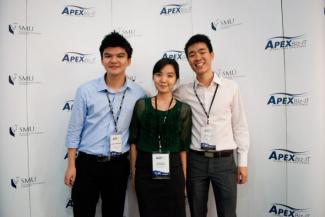
How can IT solutions play a key role in enabling Sustainable Supply Chains?
That was the challenge presented to the teams from 22 universities from 12 countries around the world at the 6th edition of the APEX Business-IT Global Case Challenge held at SMU over five days in May.
Organised by students from the School of Information Systems (SIS) at SMU, the international competition is held annually for upper-year undergraduates. Every year, an original case is crafted by the SMU Case Writing Initiative, highlighting specific real-world challenges, technology options, implementation scenarios and managerial choices that are deemed to be especially relevant to current and emerging issues being faced by managers as they grapple with using IT to enhance their competitive advantage. The case challenges students to design a solution that enhances the organisation’s performance while taking into consideration its circumstances.
After three gruelling rounds - from the preliminaries, semi-finals, to the grand finals – Team Nexus, comprising SMU students Fransisca Fortunata (SIS), Robyn Cheng King (SIS) and Goh Yixiong (LKCSB) beat off stiff competition from five other finalists to emerge as champions. The team was coached by SIS adjunct faculty Mr Wong Yuet Nan.
The Case Partner of this year’s competition was Green Freight Asia (GFA), a not-for-profit organisation made up of key players in the logistics and manufacturing industries. The challenge it presented to the participating teams was to create an IT solution partnership that would support GFA’s programme for the adoption of green freight practices in the Asia Pacific region.
Said Robyn Cheng King of Team Nexus, “The APEX Business-IT Global Case Challenge is different from all the case competitions I’ve participated in before, in the sense that it emphasizes the role that IT plays in the solution. My team had to employ a different framework and thought process when designing the case solution. We found the thematic workshop and discussion forum with the panel of industry experts to be extremely useful in understanding the key issues, pain points and constraints the industry was facing. These were vital in helping us develop a comprehensive solution.
“The challenge here was to tailor specific solutions to each of GFA’s stakeholders: shippers who initiate the supply chain, freight carriers who forward the cargo, and sub-contractors who deliver the cargo to its final destination. All these stakeholders play an integral role in the adoption of sustainable green transport policies in the logistics supply chain.”
Team Nexus utilised prescriptive analytics and gamification in creating its solution, both of which are the latest trends in the IT industry. For the shippers, Nexus proposed an IT system which will allow shippers access to a “green directory” of service providers who have GFA’s Green Leaves label. The IT system is also augmented with a global heat map, which tracks and details the shipper’s carbon footprint in regions where they send shipments to. For freight carriers, Team Nexus proposed an analytics dashboard to assist in optimising their supply chain processes. Finally, for sub-contractors, the team proposed the use of mobile devices which will track and reward fuel savings initiatives.
Team Nexus then used these solutions as the basis to formulate a business model for GFA, consisting of charging tiered membership fees and the option of selling industry reports to its stakeholders. This will help ensure the viability of GFA as a non-profit organisation.
Several new features were introduced to the competition this year. Teams were not only provided with the cases for their deliberation, they were also introduced to the Live Feed. This allowed for two-way ‘live’ communication between the teams and the Case Partner, allowing teams to pose questions and receive replies in a short time.
Another first in this year’s competition was the introduction of the Plate Competition. Teams which who did not make it to the Grand Finals took part in the Plate Competition, where they were given less than 18 hours to highlight the most creative idea within their solution to a panel of judges. They were provided with a $20 budget to purchase items that would be part of their presentations.
Assistant Professor Jason Woodard from SMU School of Information Systems who oversaw the organisation of the competition, said “As the premier business-IT case competition in Asia Pacific, the SMU APEX Business-IT Global Case Challenge occupies a distinctive position: we jointly emphasise the design of IT-enabled solutions and the use of those solutions to transform businesses over time, and we provide a regional focus on new technology trends that will impact businesses worldwide. Our student committee also works hard to refresh the competition format every year to provide a new experience even for returning teams.
“The level of competition this year was very high and the quality of the solutions presented was exceptionally impressive. The participants also enjoyed opportunities to network with industry leaders as well as with fellow students from across the world. We look forward to welcoming back these teams, as well as new participating universities, for the competition in 2015!”
Another report about this competition can be found in Perspectives@SMU at http://www.smu.edu.sg/perspectives/2014/06/25/case-case-competitions
[Photo: Team Nexus from SMU, comprising (from left) Robyn Cheng King, Fransisca Fortunata and Goh Yixiong, emerged champions in this year’s APEX Business-IT Global Case Challenge]